Black Earth Rising: The Rwandan genocide and its aftermath
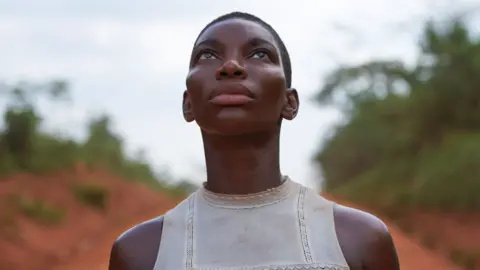 BBC/Drama Republic
BBC/Drama RepublicBlack Earth Rising is the new BBC Two thriller, which focuses on the Rwanda's 1994 genocide and its aftermath.
During just 100 days in 1994, ethnic Hutu extremists killed about 800,000 people as they set out to exterminate Rwanda's minority Tutsi community, and their political opponents, irrespective of their ethnic origin.
The genocide's end did not mark the end of the killings - it spilled into Rwanda's giant neighbour, the Democratic Republic of Congo, where it has led to an estimated five million deaths in a conflict which involved several other countries and which remains unstable to this day.
How did the genocide start?
About 85% of Rwandans are Hutus but the Tutsi minority has long dominated the country. In 1959, the Hutus overthrew the Tutsi monarchy and tens of thousands of Tutsis fled to neighbouring countries, including Uganda.
A group of Tutsi exiles there formed a rebel group, the Rwandan Patriotic Front (RPF), which invaded Rwanda in 1990 and fighting continued until a 1993 peace deal was agreed.
On the night of 6 April 1994 a plane carrying then President Juvenal Habyarimana, and his Burundian counterpart Cyprien Ntaryamira - both Hutus - was shot down, killing everyone on board.
Hutu extremists blamed the RPF and immediately started a well-organised campaign of slaughter. The RPF said the plane had been shot down by Hutus to provide an excuse for the genocide.
How was the genocide carried out?
With meticulous organisation. Lists of government opponents were handed out to militias who went and killed them, along with all of their families. Neighbours killed neighbours and some husbands even killed their Tutsi wives, saying they themselves would be killed if they refused.
At the time, ID cards had people's ethnic group on them, so militias set up roadblocks where Tutsis were slaughtered, often with machetes which most Rwandans kept around the house. Thousands of Tutsi women were taken away and kept as sex slaves.
The Hutu extremists set up radio stations and newspapers which broadcast hate propaganda, urging people to "weed out the cockroaches" - code for "kill the Tutsis". The names of those to be murdered were read out on radio. Even priests and nuns have been convicted of killing people, including some who sought shelter in churches.
By the end of the 100-day killing spree, around 800,000 Tutsis and moderate Hutus had been killed.
Black Earth Rising is the story of Kate Ashby, played by Michaela Coel, who was rescued from the genocide as a child and was brought up in the UK.
Did anyone try to stop it?
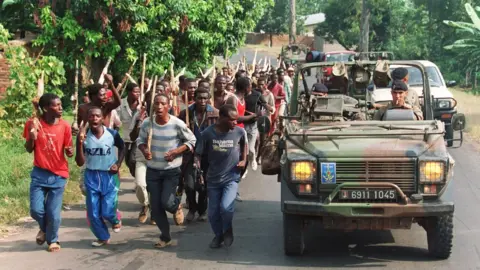 AFP
AFPThe UN and Belgium had forces in Rwanda but the UN mission was not given a mandate to stop the killing due to the US's reluctance to get involved in another African conflict.
The Belgians and most UN peacekeepers pulled out after 10 Belgian soldiers were killed. The French, who were allies of the Hutu government, sent a force to set up a supposedly safe zone but were accused of not doing enough to stop the slaughter in that area.
How did it end?
The well-organised RPF, backed by Uganda's army, gradually seized more territory, until 4 July, when its forces marched into the capital, Kigali, led by Paul Kagame, who is now Rwanda's president.
Some two million Hutus, including many of the militias who carried out the genocide, fled to Rwanda's enormous neighbour, DR Congo, then called Zaire, fearing reprisal attacks.

Black Earth Rising continues on BBC Two at 21:00 on 18 September

What happened in DR Congo?
The RPF, now in power in Rwanda, embraced militias fighting both the Hutu militias and the Congolese army, which was aligned with the Hutus.
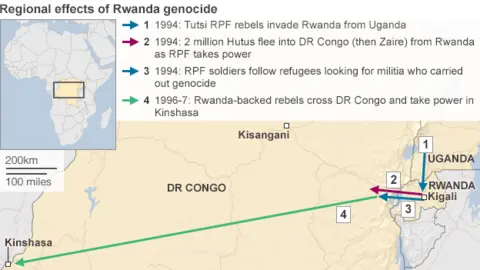
The Rwanda-backed rebel groups eventually marched on Kinshasa and overthrew the government of Mobutu Sese Seko, installing Laurent Kabila as president.
But President Kabila's reluctance to tackle Hutu militias led to a new war that dragged in six countries and led to the creation of numerous armed groups fighting for control of this mineral-rich country.
An estimated five million people died as a result of the conflict which lasted until 2003, with some armed groups still active now in the areas near Rwanda's border.
So have the guilty faced justice?
Black Earth Rising highlights the complex task of pursuing justice - in which some of the apparent heroes of the genocide, like former soldiers and generals who helped end the slaughter, could also be villains.
This was seen in the tribunals and court cases that followed the slaughter.
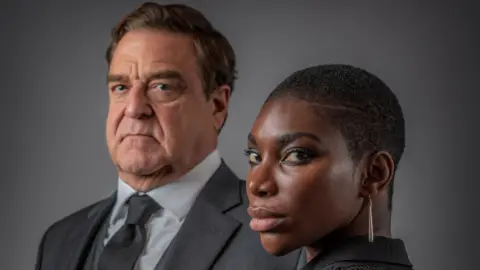 BBC/Forgiving Earth Ltd
BBC/Forgiving Earth LtdThe International Criminal Court was set up in 2002, long after the Rwandan genocide so could not put on trial those responsible.
Instead, the UN Security Council established the International Criminal Tribunal for Rwanda in the Tanzanian town of Arusha to prosecute the ringleaders.
A total of 93 people were indicted and after lengthy and expensive trials, dozens of senior officials in the former regime were convicted of genocide - all of them were Hutus.
Have any Tutsis been prosecuted?
All sides involved in the DR Congo conflict were accused of committing abuses.
A 2012 report by the UN accused Rwanda of backing a rebellion by the M23 - a mainly ethnic Tutsi movement - which Rwanda denies.
The group was initially said to have been led by Bosco "Terminator" Ntaganda, an ethnic Tutsi, who fought with the RPF in Rwanda in the 1990s.
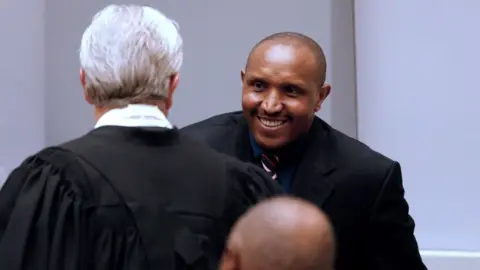 AFP
AFPAccording to a UN investigation, Mr Ntaganda later built a lucrative business empire for himself during the conflict in DR Congo - reportedly collecting taxes from mines controlled by the soldiers under his command, charcoal markets and illegal checkpoints.
Gen Ntaganda, who is accused of recruiting child soldiers and massacring civilians in DR Congo, was sent to the ICC at The Hague following his surrender at the US embassy in Rwanda in March 2013.
He is currently awaiting a verdict after the end of his trial.
In Black Earth Rising, the fictional character of Simon Nyamoya, played by Danny Sapani, bears some similarities to Mr Ntaganda.
Human rights groups also say the RPF killed thousands of Hutu civilians as it took power - and more after they went into DR Congo to pursue some of the genocidal militias.
Some want RPF officials, including President Kagame, to face trial for their alleged crimes, which are denied by all those accused.
The issue sparked a diplomatic row when France accused Mr Kagame's allies of shooting down the plane which triggered the genocide - an allegation Mr Kagame dismissed as "ridiculous" and which prompted him to break off relations with Paris for three years in 2006. Relations between both countries have remained tense ever since.
What is Rwanda like now?
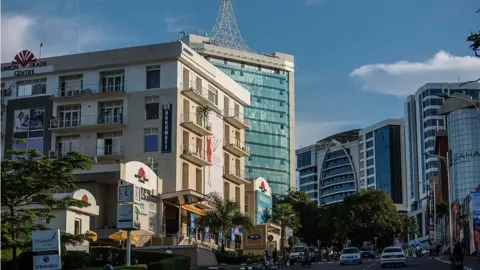 Getty Images
Getty ImagesPresident Kagame, has been hailed for transforming the tiny, devastated country he took over through policies which encouraged rapid economic growth. He has also tried to turn Rwanda into a technological hub and is very active on Twitter.
But his critics say he does not tolerate dissent and several opponents have met unexplained deaths, both in the country and abroad.
The genocide is obviously still a hugely sensitive issue in Rwanda, and it is illegal to talk about ethnicity.
The government says this is to prevent hate speech and more bloodshed but some say it prevents true reconciliation.
Charges of stirring up ethnic hatred have been levelled against some of Mr Kagame's critics, which they say is a way of sidelining them.
He won the most recent election with 99% of the vote.
